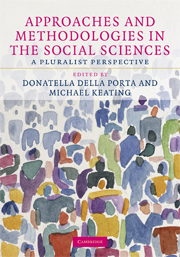Book contents
- Frontmatter
- Contents
- List of figures
- List of tables
- Contributors
- Preface
- 1 Introduction
- Part I Epistemology and philosophy of the social sciences
- 2 How many approaches in the social sciences? An epistemological introduction
- 3 Normative political theory and empirical research
- 4 Causal explanation
- 5 Constructivism: what it is (not) and how it matters
- 6 Culture and social science
- 7 Historical institutionalism
- 8 Game theory
- 9 Rationality and recognition
- Part II Research design
- References
- Glossary
- Index
7 - Historical institutionalism
Published online by Cambridge University Press: 05 June 2012
- Frontmatter
- Contents
- List of figures
- List of tables
- Contributors
- Preface
- 1 Introduction
- Part I Epistemology and philosophy of the social sciences
- 2 How many approaches in the social sciences? An epistemological introduction
- 3 Normative political theory and empirical research
- 4 Causal explanation
- 5 Constructivism: what it is (not) and how it matters
- 6 Culture and social science
- 7 Historical institutionalism
- 8 Game theory
- 9 Rationality and recognition
- Part II Research design
- References
- Glossary
- Index
Summary
Historical institutionalism is neither a particular theory nor a specific method. It is best understood as an approach to studying politics and social change. This approach is distinguished from other social science approaches by its attention to real-world empirical questions, its historical orientation and its attention to the ways in which institutions structure and shape behaviour and outcomes. Although the term ‘historical institutionalism’ was not coined until the early 1990s, the approach is far from new. Many of the most interesting and important studies of politics – from Karl Polanyi's classic Great Transformations, to Theda Skocpol's States and Social Revolutions and Philippe Schmitter's Still a Century of Corporatism? – would clearly be categorized as historical institutionalist were they written today.
The best way to explain historical institutionalism (HI) is to situate this approach in a historical and comparative context, showing where the approach originated and how it is different from other approaches in the social sciences. In short, what follows is an HI account of historical institutionalism. The chapter concludes with a discussion of the implications of this approach for our understanding of political and social science as ‘science’.
Origins
Institutional theory is as old as the study of politics. Plato and Aristotle to Locke, Hobbes and James Madison long ago understood the importance of political institutions for structuring political behaviour.
- Type
- Chapter
- Information
- Approaches and Methodologies in the Social SciencesA Pluralist Perspective, pp. 118 - 138Publisher: Cambridge University PressPrint publication year: 2008
- 195
- Cited by

